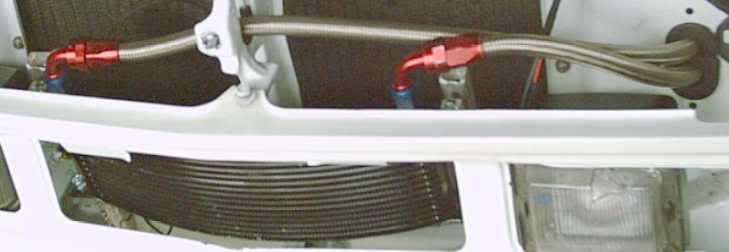I've been wanting to add an oil cooler to the 'rolla since the engine nearly overheated and a coolant hose blew up last time I did some laps.
Now the oil-to-air cooler should give more cooling power since it's adding its own heat exchanger to the car, but do these cause any trouble with oil changes? I can imagine some old oil could get trapped in the lines or cooler itself.
I could also get an oil-to-water cooler from a 5SFE engine, the downsides are the possibility of oil and coolant mixing if it fails and the fact that you're just dumping more heat into the radiator.
I want to be able to run this engine flat out all day like a videogame car - which is what I was doing until that incident, but I want to be on the safe side now. What say ye?
Leftover oil during a change doesn't appear to be a problem with the multitude of cars that come with oil coolers. I know my RX7 has a large air/oil cooler, as does my truck.
Either usually work... the oil/water type have an added feature that the coolant speeds up oil warming.
I have a full air/oil cooler in my car, fitted using a Mocal thermostatically controlled oil filter adapter, AN8 lines and an Earl's curved single row cooler

The stock configuration on my VR6 Corrados is oil to water. We call it the "oil warmer". I know Cs are notorious for running hot, but IMO you want air if you're going to be wailing on it all day long.
The coolant "cooled" exchange units serve a dual function - warm up the oil more quickly (better for the engine) and help keep the oil near that optimum temperature.
Most diesels use the water-oil cooler, and they work very well. But those trucks also have huge radiators with a lot of extra heat rejection capacity so no worries there. As noted, they are mainly designed to stabilize oil temps, not necessarily cool the oil.
If I was adding an oil cooler to a race car, I would add an air-oil cooler because it will not affect radiator cooling capacity, unless I had cooling capacity to spare.
I've got a bitchin' oil:water heat exchanger off a P71 that I plan to use on something cool someday. I greatly prefer oil:water, but there are pros and cons to both. Water to oil is typically better as most have mentioned above:
Pro:
Only have to package one heat exchanger with good airflow (radiator)
Typically less oil plumbing required with little impact on water plumbing (less chance of leaks, little impact on engine oiling, less cost, etc.)
Use one thermostat for two systems (water temp is controlled in a narrow band)
Oil warms up faster
Oil doesn't get as hot
Only one temp gauge required
Can be very cheap
Con:
It is possible to get oil and water mixing (OEM/high quality heat exchangers recommended!)
Larger radiator required if your current one is just barely big enough
If you have low airflow in multiple points (instead of high flow in one spot), multiple individual coolers may be preferred (ie. formula style racer vs. standard passenger car)
Can be very expensive
Bryce
The 460 in my F-250 has an air oil cooler, stock.
No thermostat, no fuss at oil changes, it just plain works.
Just put it in and don't stress about it too much.
I wouldn't use an oil cooler to cool the engine, that's what a bigger or more efficient radiator is for. The oil cooler is to keep the oil from breaking down and losing it's lubricating properties.
Shawn
You'll need to log in to post.